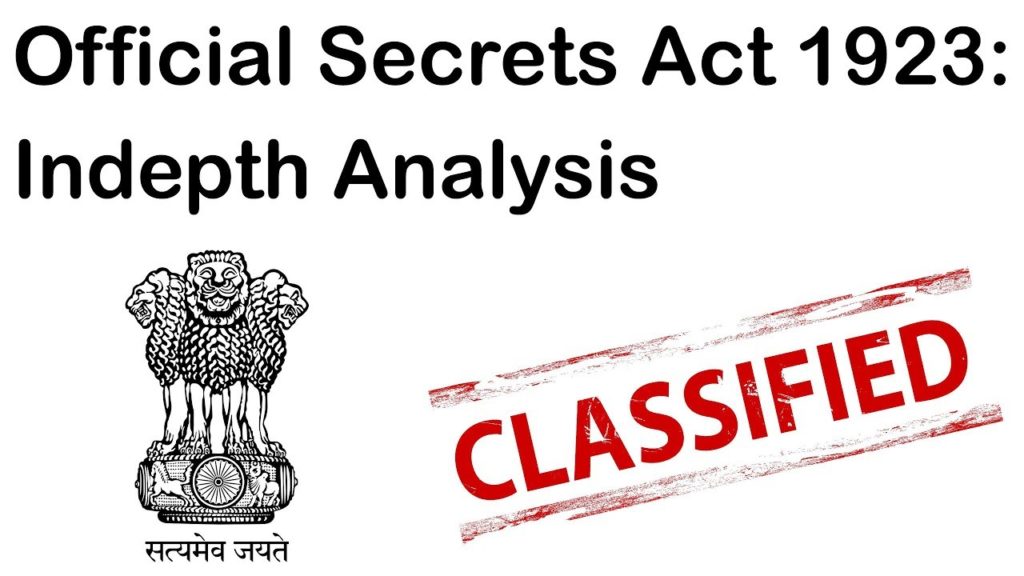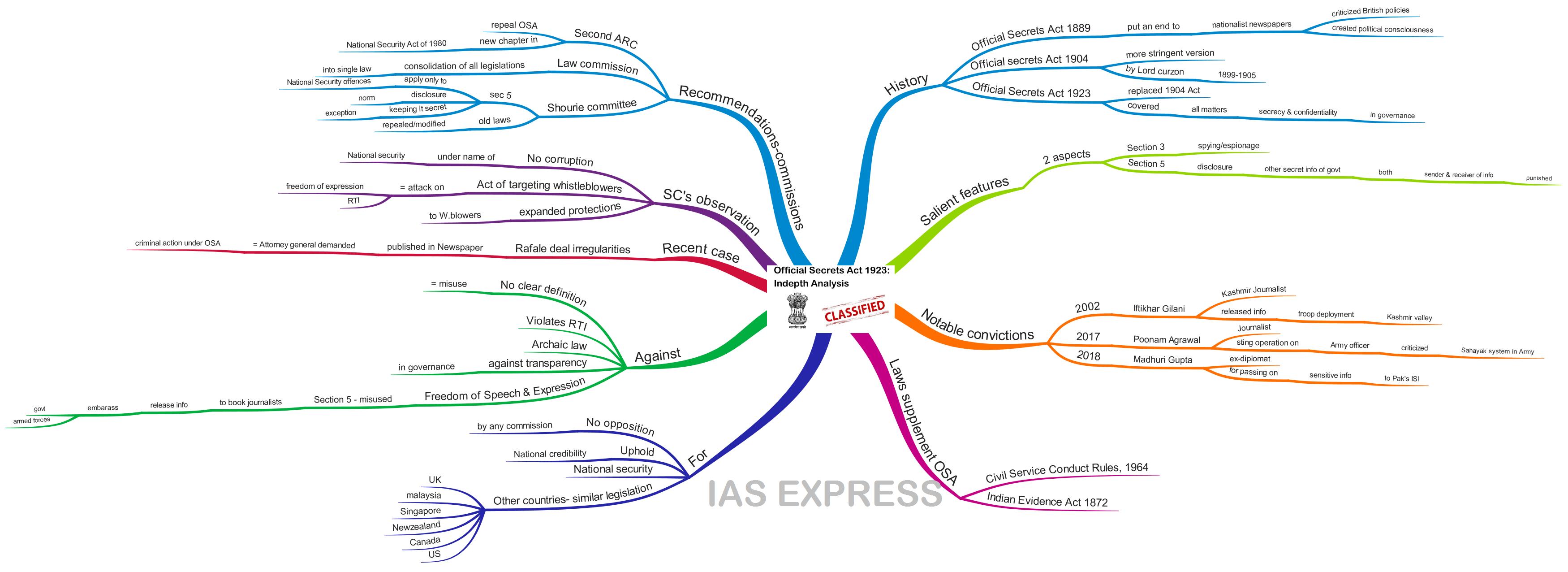Official Secrets Act – Transparency Vs National Security

From Current Affairs Notes for UPSC » Editorials & In-depths » This topic
IAS EXPRESS Vs UPSC Prelims 2024: 85+ questions reflected
The Official Secrets Act (OSA) has been in the news recently due to the debate over ‘stolen documents’ in Rafale case. The Attorney-General has suggested “criminal action” against those responsible for making ‘stolen documents’ public.
OSA is a colonial-era law that seeks to ensure secrecy and confidentiality in governance especially on national security and espionage issues.
However, successive governments have faced criticism for misusing the law against journalists and whistleblowers thus violating their right to freedom of speech and expression.
What is the history of the Official Secrets Act (OSA)?
- The Indian Official Secrets Act of 1889 was enacted at a time when a large number of powerful newspapers had emerged in different languages across the country.
- Fearless editors criticized the British Raj’s policies on a daily basis, created political consciousness among the people, and faced police crackdowns and prison terms to continue their mission and convictions.
- Thus the main purpose of the Act was to put an end to the voice of nationalist publications.
- A more stringent version of OSA named The Indian Official Secrets Act, 1904 was enacted during the period of Lord Curzon, Viceroy of India from 1899-1905.
- In 1923, the British government had notified a newer version of the law which replaced the 1904 Act and it covered all matters of secrecy and confidentiality in governance in the country.
What are the Salient Features of the Official Secrets Act?
- The law broadly deals with 2 aspects namely: 1) Section 3 – which deals with spying or espionage, and 2) Section 5 – which deals with disclosure of other secret information of the government.
- The secret information can be any official code, password, sketch, plan, model, article, note, document or information.
- Under Section 5, both the person who communicates the information and the person who receives the information can be punished by the prosecuting agency.
What are the notable convictions under the Official Secrets Act?
- 2002: Iftikhar Gilani, the then Kashmir Journalist was arrested and charged under the OSA for allegedly possessing secret documents with respect to the deployment of troops in the Kashmir valley. The State later withdrew the case.
- 2017: Journalist Poonam Agrawal was charged under OSA for conducting a sting operation on an Army officer who opposed the Sahayak system in the Army.
- 2018: the Delhi Court held ex-diplomat Madhuri Gupta, who had served at the Indian High Commission in Islamabad under the OSA and sentenced her to 3 years imprisonment for passing on sensitive information to Pakistan’s ISI.
What are the laws that supplement OSA?
- Civil Service Conduct Rules, 1964 which prohibits communication of an official document to any person without permission.
- Section 123 of the Indian Evidence Act of 1872 prohibits publishing the evidence from the unpublished official records without the authorization of the Head of the department, who has high discretion in the matter.
What are the arguments in favour of the Official Secrets Act?
- No opposition: Official Secrets Act has not been opposed by any commission as there are a need and necessity of the laws that can keep the specific documents of the state secret. Only a few unclear provisions of the act require change.
- National credibility: There is a requirement of strong laws to deal with the crimes against the state, that undermines the credibility of the state.
- National Security: There are many documents which need to stay secret like locations of a military installation, which if leaked would go against the security of the nation and benefit the enemy
- Other countries have similar legislation: Many nations including the United Kingdom, Malaysia, Singapore, and New Zealand continue to use the legislation for protecting state secrets. In 2001, Canada replaced its OSA with a Security of Information Act. The Official Secrets comes under the Espionage Act of the United States.
What are the arguments against the Official Secrets Act?
Definition: Lack of a clear definition of “secret” documents or information = government can declare any document as official secrets.
RTI: It violates the Right to Information (RTI) Act of 2005.
Archaic law: OSA was enacted during colonial times where there was mistrust of people and the primacy of public officials in dealing with the citizens. But it doesn’t suit to present democratic India.
Governance: OSA promotes the culture of secrecy in the governance and makes disclosure an exception = against the transparency requirement of democratic governance.
- Records which are meant to be confidential are sometimes crucial in bringing illegalities to public attention.
- This was true in the 1980s of irregularities in Bofors defence deal.
- More recently, in 2016, the Panama papers involved the painstaking unveiling of offshore transactions in tax havens = resulted in government tracing out of hundreds of crores of undeclared assets.
- However, in every other instance, the OSA hampers the process.
Freedom of speech & expression: Section 5 of OSA which deals with potential breaches of national security is frequently misinterpreted and misused to frame journalists.
- The Section makes it a punishable offence to share information that may help an enemy state.
- Thus it comes in handy for the government to book journalists when they publicize information that may embarrass the government or the armed forces.
- However, The Delhi High Court in 2009 has declared that publishing a document merely labelled as “secret” shall not render the journalist liable under the OSA.
What is the recent case regarding OSA?
- The recent case is related to the alleged irregularities in the Rafale aircraft deal between India and France which was published in ‘The Hindu’ Newspaper.
- The Attorney General, however, expressed an objection in court and sought dismissal of the review petitions on the ground that the reports mentioned documents “stolen” from the defence ministry = need to take “criminal action” against those responsible for making ‘stolen documents’ public.
- Thus the OSA was utilized by the government as a shield against allegations of wrongdoing in the Rafale deal.
What is the Supreme Court’s observation?
- Corruption complaints should not be protected under the guise of national security.
- The Act did not provide the liberty to commit corruption.
- The court dismissed the act of targeting the messenger and criminalization of the whistleblowers in the name of national security or stability of government or official secrecy.
- The court called such actions as an attack on the freedom of expression and the people’s right to information.
- The right to freedom of speech & expression and information should be prioritised over the archaic Official Secrets Act.
- The Court expanded the protections to the whistleblowers to make sure that those who expose corruption and wrongdoing should not be made vulnerable to any threats.
What are the recommendations of various commissions?
- 2nd Administrative Reforms Commission (ARC) Report suggested repeal of OSA and replaced with a new chapter in the National Security Act of 1980.
- The Law Commission also suggested consolidation of all legislation dealing with national security into a single law and pass the “National Security Bill”.
- Commission also recommended that any person voluntarily receiving any official secret knowing or having reasonable ground to believe, at the time he receives it, that the official secret is communicated in contravention of this Act, shall be guilty of an offence under this section.
- The Shourie Committee suggested a comprehensive amendment of Section 5(1) to make the penal provisions of OSA applicable only to violations affecting national security.
- The Commission is of the view that the disclosure of information has to be the norm and keeping it secret should be an exception.
- The old law/s must be repealed or modified for sending a strong signal about the change and for the sake of effective implementation of the law.
If you like this post, please share your feedback in the comments section below so that we will upload more posts like this.


